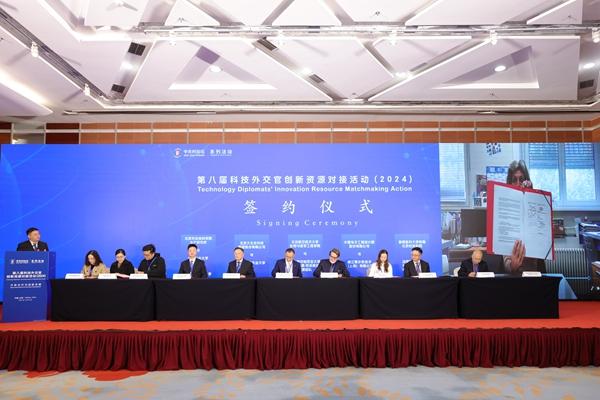
 0 Comment(s)
0 Comment(s) Print
Print E-mail China.org.cn, November 21, 2024
E-mail China.org.cn, November 21, 2024
The eighth Technology Diplomat Innovation Resource Matchmaking Action takes place in Beijing, Nov. 20, 2024. [Photo provided to China.org.cn]
The eighth Technology Diplomat Innovation Resource Matchmaking Action took place in Beijing on Wednesday, themed "Open Cooperation and Innovative Development."
The Beijing International Cooperation Center of Science and Technology hosted the event to strengthen international innovation connections, accelerate technological advancement and support Beijing's development as a global innovation hub.
China continues to pursue its innovation-driven development strategy. In 2023, the country's research and development spending exceeded 3.3 trillion yuan ($455 billion), marking an 8.14% increase compared to the previous year. Alongside these efforts, the nation maintains a strong focus on international scientific collaboration.
Zhuang Jia, deputy director-general of the Department of International Cooperation of the Ministry of Science and Technology, underscored China's global approach to technological innovation. She noted the country's growing integration into worldwide innovation networks and its role in global tech governance.
To date, China has established sci-tech cooperation with over 160 countries and regions and signed more than 110 intergovernmental agreements.
Zhuang emphasized the role of science and technology diplomats as bridges between Chinese and global scientific communities and as catalysts for international sci-tech cooperation. She said the event would strengthen international collaboration in emerging technologies and benefit humanity through innovation.
This year's matchmaking event was officially incorporated into the series of Zhongguancun Forum, a state-level platform for global sci-tech innovation exchanges and cooperation.
Zhang Yulei, deputy director of the Beijing Municipal Science & Technology Commission and the Administrative Commission of Zhongguancun Science Park, reaffirmed Beijing's commitment to sci-tech innovation. She noted that Beijing strives to meet world-class innovation standards by supporting international cooperation among diverse innovation entities and facilitating the orderly exchange of global innovation resources.
In recent years, Beijing's R&D spending has consistently exceeded 6% of its GDP, with about 16% going to basic research — comparable to leading innovative countries.

Five major cooperation agreements were signed between China and partners from Italy, the U.K., France, and Croatia at the eighth Technology Diplomat Innovation Resource Matchmaking Action held in Beijing, Nov. 20, 2024. [Photo provided to China.org.cn]
Five major cooperation agreements were signed between Chinese institutions and partners from Italy, the U.K., France and Croatia, covering medicine, food science and pollutant treatment technologies.
Speaking on behalf of the signatories, Antonio Apicella, a distinguished professor and founder of the Advanced Materials Lab at Italy's University of Campania, highlighted the achievements of the China-Italy Science, Technology & Innovation Week. He emphasized the significance of Sino-Italian collaboration in innovation and education for future development.
During the policy promotion session, officials presented management measures for funds supporting the international development of the Zhongguancun National Innovation Demonstration Zone. Diplomatic representatives from Indonesia, Mexico, Algeria, Namibia and Peru shared updates on their countries' technological developments and outlined opportunities for cooperation with China.
The event also featured presentations of 10 innovative projects from countries including Germany, Sweden and South Korea. These projects showcased the latest advances in artificial intelligence, drones, hydrogen energy markets, forest disease monitoring and elderly care, demonstrating global progress in high-impact technological fields.